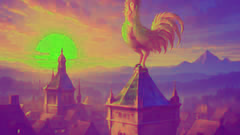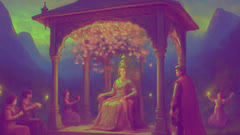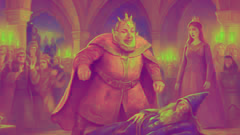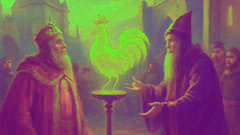Introduction
Beneath the endless sky of ancient Russia, where dawn painted the mountain peaks with rosy light and dense forests whispered of forgotten spirits, a kingdom flourished in uneasy splendor. This was the land ruled by King Dodon, whose golden-domed palace stood atop a gentle hill, gleaming above a labyrinth of rivers and meadows. Dodon was a king both proud and fretful, for his enemies pressed on every border and his sleep was haunted by visions of loss. Despite the thick stone walls and his army’s gleaming arms, unease wound through the corridors of his court like a chill draft. Each sunrise brought new rumors of invasion, treacherous neighbors, or unseen threats lurking in the wild forests beyond the city gates.
Desperate for peace, Dodon would summon his council of elders—wise men with snowy beards, their voices as measured as the ticking of ancient clocks. Yet each advice seemed to slip through Dodon’s mind like water through a sieve. The king longed for certainty, for a sign from the heavens that would guard his kingdom and let him rest at last. It was during this time of restless longing that a mysterious astrologer appeared at court, his robes shimmering with embroidered stars, eyes bright with the secrets of distant worlds. In his hands, the astrologer cradled a cage wrought of silver filigree, inside which perched a marvel: a golden cockerel, feathers gleaming as if spun from morning sunlight, eyes sharp and knowing as the wind. The astrologer’s voice, soft as falling snow, promised Dodon a gift that would warn him of every danger—a sentinel that would crow at the first sign of threat, so the kingdom could always be prepared.
Drawn to this promise, Dodon accepted the magical bird, thinking at last his worries would end. Yet as weeks turned to months, the cockerel’s golden song became both a blessing and a curse, for peace brought new temptations, and Dodon’s restless spirit would soon drive him toward a fate that no prophecy could prevent. In the shadow of enchanted forests and beneath skies ablaze with northern light, the tale of the golden cockerel would unfold—a story of pride, wisdom, and the perilous allure of the unknown.
The Gift of the Golden Cockerel
King Dodon’s kingdom was renowned for its beauty and strife in equal measure. Orchards stretched along the riverbanks, their branches heavy with cherries and plums, while onion-domed churches cast their shadows over bustling market squares. Yet Dodon himself found little peace. Every night, he paced his chambers, weighed down by the burdens of rule and the fear that enemies might strike when least expected. His sons, the princes Gvidon and Garasim, were brave but impetuous, eager for glory but inexperienced in the dark art of diplomacy.

One morning, as the dawn fog clung to the palace gardens, the astrologer arrived in a carriage pulled by white horses. His entry was as quiet as a breath of wind, but within hours, news of his presence swept through the court. The king received him in a marble chamber lit by golden candelabra. The astrologer bowed deeply and spoke, his voice imbued with the cadence of prophecy.
“Majesty, I bring you a sentinel like no other—a golden cockerel, imbued with ancient magic and wisdom beyond mortal reach. Place him upon your highest spire, and he will watch over your realm. When danger draws near, he will crow, and none shall catch your kingdom unawares.”
Dodon, eager for reassurance, pressed the astrologer for terms. The sage only smiled, requesting a single favor, to be named at a time of his choosing. Gripped by his longing for peace, Dodon agreed and summoned his stonemasons to raise a gilded perch atop the palace’s tallest tower.
The cockerel was set free to survey the land. His feathers gleamed even brighter in the open air, and his eyes shone with unspoken knowledge. Whenever trouble brewed, he would stretch his neck and let out a clarion crow that echoed across the valleys, summoning soldiers to arms and sending messengers galloping into the hills. For the first time in many years, King Dodon slept soundly. The kingdom grew tranquil. Fields flourished, and merchants returned to the marketplaces, their wagons laden with silks, honey, and amber. The people celebrated Dodon’s wisdom and the magical guardian perched above their city. Word spread far and wide that Dodon’s lands were protected by supernatural means, and the border skirmishes dwindled to nothing more than distant memory.
But peace, as it often does, became the root of new worries. The king’s sons grew restless, seeking challenges worthy of their bloodline. Courtiers whispered that complacency was dulling the kingdom’s edge. Still, Dodon remained content, until one fateful morning when the cockerel’s call pierced the dawn with unearthly urgency. The bird spun on its perch and faced the crimson east—a warning that enemies approached.
Alarmed, Dodon summoned his sons. Gvidon, proud and resolute, demanded command of the cavalry. Garasim, cunning and swift, vowed to outwit any foe. They rode out at their father’s behest, leading armies into the mist-shrouded wilderness. Days passed with no word. The king’s heart weighed heavy with dread, and sleeplessness once again haunted his nights. Each morning, the cockerel would turn and crow anew, its warning never ceasing. Rumors of lost battalions and strange happenings in the woods swept through the city. Messengers returned empty-handed or not at all. Panic set in, and Dodon feared he might lose both sons and kingdom to a threat he could not see or name.
The Queen Beyond the Mountains
Desperate to understand the peril, King Dodon called for his bravest scouts. Their tales were confused: enemy banners glimpsed at the edge of the woods, vanished caravans, flickering campfires in the distance. Unable to bear the uncertainty, Dodon resolved to ride out himself, his armor burnished and his heart pounding with dread and hope. The golden cockerel crowed again as he departed, its voice trailing over the fields like a warning bell.

The king’s journey was arduous. Dense forests pressed close on either side of the winding road, their shadows alive with secrets. Streams tumbled over mossy stones, and mountains loomed ahead like silent sentinels. Dodon’s retinue thinned as they ventured deeper; even his most loyal guards grew uneasy under the weight of unseen eyes.
On the third night, as campfires guttered under a star-flecked sky, Dodon dreamed of a woman with hair black as midnight and eyes bright as emeralds. She beckoned him toward a hidden valley where flowers bloomed in impossible colors and nightingales sang songs sweeter than any he’d heard before. At dawn, he awoke to find himself at the entrance of just such a valley—a secluded kingdom bordered by steep cliffs and silver streams. There, in a pavilion woven of silk and gold, sat the queen of his dreams.
Her beauty was spellbinding. She wore a robe of midnight blue, embroidered with crescent moons and golden stars, and her crown shimmered with pearls. She greeted Dodon with laughter soft as rain. Her court was filled with dancers and musicians, their music carrying on the wind like an enchantment. Yet beneath her dazzling smile lay an air of mystery; her words were riddles, her gaze unreadable. Dodon was bewitched at once, forgetting his quest for sons and safety. Night after night, he dined with her beneath lanterns hung from blossoming trees. The queen wove stories of distant lands and whispered promises of eternal peace if only Dodon would stay by her side.
Meanwhile, the golden cockerel continued to crow, its warnings echoing in the deserted palace. The people fretted as their king vanished and foreign shadows crept closer to their gates. Within the enchanted valley, Dodon was blind to everything but the queen’s charms. He pledged his heart and kingdom, convinced he’d found a happiness beyond anything his throne could offer. But as weeks drifted by, strange dreams haunted Dodon. He saw images of burning cities, weeping children, and the golden cockerel flapping its wings in vain atop the lonely tower. His conscience gnawed at him until, at last, he begged the queen to return with him to his own land.
She smiled with secret satisfaction and agreed. As they departed the valley, the queen’s court faded into mist, and the sky darkened with a gathering storm.
Pride and the Price of Folly
As Dodon and the queen approached the borders of his realm, a strange hush fell across the land. The fields that once rippled with wheat were choked by weeds, and the city gates hung open, unguarded. In their absence, the kingdom had grown vulnerable. People watched in silence as the royal carriage rolled through the empty streets. Many whispered that the king had returned with a sorceress or spirit, for the queen’s beauty was beyond mortal measure.

Dodon was deaf to these murmurs. He paraded the queen through the capital, declaring her his bride and the new sovereign of the land. Festivities erupted: bells rang from every steeple, and tables groaned with roasted meats and honey cakes. Yet beneath the revelry simmered unease. The court’s wisest counselors were wary of the queen’s sudden rise. The golden cockerel, perched atop its spire, grew ever more agitated, its cries sharper and more urgent.
The astrologer returned to claim his promised favor. Entering the great hall as the wedding feast reached its height, he approached Dodon and bowed deeply. “Majesty,” he said quietly, “my service is done. As agreed, I come to name my reward.” Dodon, drunk on triumph and infatuation, waved his hand impatiently. “Ask anything within my power!”
The astrologer’s eyes flashed with hidden knowledge. “Then grant me the queen.”
A hush fell over the court. Dodon’s face contorted with rage. How dare this stranger lay claim to his queen? In a fit of fury, Dodon struck down the astrologer before any could intervene. The court recoiled in horror as the astrologer collapsed, his robes pooling like spilled ink upon the marble floor.
At that instant, the golden cockerel let out a piercing shriek—louder than ever before. The sky darkened as thunder rolled across the hills. The queen rose from her throne, her eyes cold and pitiless. She gazed upon Dodon, then vanished in a swirl of silver mist. The courtiers fled in terror as chaos erupted in the palace. Outside, storms battered the city, and the cockerel took flight, soaring into the darkness.
With the queen’s disappearance and the astrologer’s death, a dreadful curse settled over Dodon’s kingdom. Crops withered, rivers dried, and enemies gathered at the borders. Bereft of wisdom and blinded by pride, Dodon could only watch as his realm unraveled. He wandered the empty halls of his palace, haunted by echoes of laughter and love now lost forever.
Conclusion
So ended the reign of King Dodon—a monarch undone not by swords or sorcery, but by the relentless currents of pride and folly. The once-prosperous kingdom faded into legend, its fields left untended and its towers surrendered to ivy and shadow. Travelers who passed through spoke of a palace haunted by the ghostly crowing of a golden cockerel, perched atop a ruined spire and singing to the empty sky. In time, wiser rulers emerged elsewhere, taking heed from Dodon’s fate: true wisdom can’t be bought or borrowed from magic, nor can peace be secured through force or enchanted gifts alone. Instead, it grows from humility, patience, and a willingness to listen to counsel—especially when it comes from unlikely sources. The tale of the golden cockerel lingers on in every hearth-side story and every child’s dream, a shimmering reminder that power gained without wisdom leads only to ruin. And should you ever hear the call of a golden bird at sunrise, let it serve as a warning: cherish wisdom above all else, lest pride sweep away everything you hold dear.













